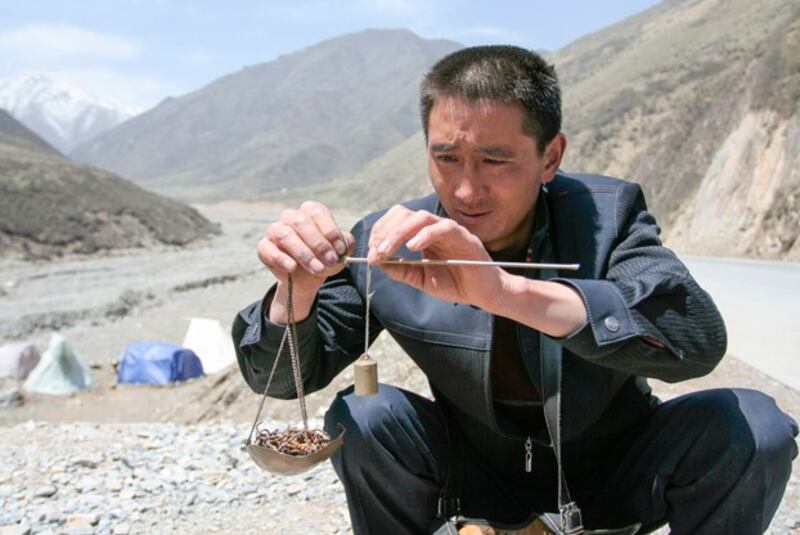Six Tibetan caterpillar fungus harvesters and sellers from eastern Tibet have been detained by Chinese police after attempting to report a buyer who allegedly defrauded them, sources with knowledge of the situation said.
The harvesters from farming or nomadic families in Chamdo city’s Tengchen county, or Dengqen in Chinese, were trying to report a Chinese merchant who allegedly duped 26 Tibetans out of caterpillar fungus worth 2.5 million yuan, or about US$344,000, the sources said.
In English, the substance is called caterpillar fungus, but it is more widely recognized throughout Asia by its Tibetan name yartsa gunbu, which means "summer grass, winter worm."
Many Tibetans in the county rely on income from selling the fungus to make a living.
Highly valued in traditional medicine and sometimes fetching up to US$50,000 per pound, the fungus is believed to treat various ailments, despite lacking scientific validation.
Related stories
[ In Tibet, parents plead for children to help collect caterpillar fungusOpens in new window ]
[ Shrinking harvest of caterpillar fungus puts squeeze on Tibetan herdersOpens in new window ]
Police detained the six Tibetans — Dhargey, Drubgha, Ngado, Samdup, Tsering Dhargey and Tsega — on June 18 when they traveled to northern China’s coastal city of Tianjin to lodge a complaint, said the sources, who requested anonymity for fear of reprisals by authorities.
Two police officers from Chamdo city and a local officer initially detained the group there before transferring them to Tengchen county, the sources said. Their current whereabouts are unknown.
Scammed
Twenty-six Tibetans in the county who accumulated their own stocks of caterpillar fungus, supplemented by additional purchases, sold their entire supplies to Chinese businessman Lin Jinyuan, who offered 5,000 yuan, or nearly US$700, more per kilogram than other buyers, said a Tibetan from the region.
Upon learning that Lin owned stores and hotels in Beijing and Tianjin, the sellers immediately trusted him and agreed to sell their stocks, he said.

Lin gave them a receipt and promised to pay them the money after a few days, but on June 9, he vanished from Tengchen and could not be found, the source said.
“When the Tibetan sellers went to the address on the receipt in Tianjin to collect their payment for the caterpillar fungus, they realized they had been duped,” the Tibetan told Radio Free Asia. “The receipt was fake and did not belong to him.”
Chinese authorities detained the Tibetans for taking the matter into their own hands rather than following the proper protocol for lodging complaints, and for creating a commotion, a second Tibetan from Tibet told RFA.

“The Tibetan sellers, however, insisted that all they want is to recover the money the Chinese businessman duped them out of,” he said. “They have submitted all the evidence, including a picture of the Chinese businessman and the receipts he gave them.”
Local authorities and police in Tengchen county warned the Tibetans to follow proper procedures or risk imprisonment instead of recovering their money, he said.
Translated by Tenzin Dickyi for RFA Tibetan. Edited by Roseanne Gerin and Malcolm Foster.
